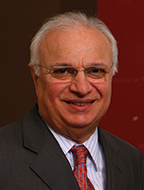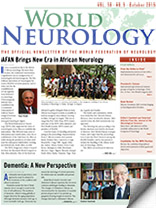By Raad Shakir

Raad Shakir
The World Federation of Neurology will have its showpiece biennial World Congress of Neurology (WCN), with Santiago, Chile, hosting Oct. 31-Nov. 5. This is the only international congress where all neurology specialties and interest groups have their chance to interact and show their progress to an international audience. The Scientific Program Committee tries to contact all interested groups to ask them to convene sessions with their proposed topics and speakers.
The choices for the number of sessions and topics are most difficult to get absolutely spot-on, and there always will be some topics or groups needing more time or attention. The Organizing Committee tries hard to have wide and varied representations. This has to be balanced against the paramount goal of bringing the most up to date science to the audience.
Participation of regional neurological associations, which have their own congresses, adds a different slant to the WCN. The six regions of the world are represented, and their sessions are left to them to organize. This is always interesting and adds and element of specific regional flavor to observe and share with the entire world.
Participation of sister brain alliance organizations represented by their symposia puts another dimension to the WCN. It is most important to see that psychiatry, neurosurgery, rehabilitation, child neurology and brain scientists participate with their own symposia. This only emphasizes brain health as a single entity. Presidents of all these organizations attend and deliver their views on common topics.
It is most important for neurologists to closely interact with allied specialists in combating all aspects of diseases of the nervous system. Neurologists, psychiatrists and neurosurgeons are moving closer in understanding brain physiology, and as an example deal with issues such as deep brain stimulation in various conditions, such as movement disorders, epilepsy, depression, anxiety and obsessive compulsive disorder. On the other hand, the field of the dementia further cements the close relationship between neuroscientists, neurologists and psychiatrists. The use of fMRI has an increasing role in all specialties and our understanding of basic brain dysfunction has been revolutionized. The WCN program brings all this to the fore, and the days of living in silos are long gone.
The World Health Organization (WHO) and interest in non-communicable diseases is the way to move ahead in promoting neurological education and care. The WCN offers a symposium jointly with the WHO, as it has done previously, to make sure the voice of neurology is heard at the highest levels among decision-makers who control the provision of health care across the world. It is absolutely crucial that neurologists keep politicians and economists fully engaged and aware of the devastating consequences of brain diseases and the impact upon society.
The WCN is a major teaching opportunity for many, and the teaching courses are intermingled with scientific presentations to attract the maximum number of attendees. It is always a major task for the organizers to hold themed teaching courses and scientific sessions on the same days to keep the linear structure of a congress.
The WCN moves continents for good reasons. The WFN provides education and exposure to neurologists from all over the world, and hence the emphasis may be different in different locations. This is encouraged in order to maintain the individuality and different flavor of each congress in order to avoid carbon copy congresses.
For several congresses now, the WFN has made a point on inviting a Noble laureate to deliver the keynote presentation. The XXII congress is no exception. Prof. Thomas C. Sudhof, Noble laureate in physiology or medicine 2013, will deliver “Neurexins and Company: Toward a Molecular Logic of Neural Circuits” Nov. 2.
There is now huge emphasis on the place of neurology in the fight against non-communicable diseases. The WHO and the United Nations have taken a major step, and all their agencies are working hard to promote this goal. The WFN has a major role to play as an official WHO partner, and the WCN is a prime showcase venue for the activity. The WHO leadership is well represented, and input will help to move brain health ahead. WHO Assistant Director General Oleg Chestnov will deliver a plenary lecture on the current status of non-communicable diseases and the role neurology is expected to play in the process.
Every neurologist knows well that our specialty has changed even over the short and medium term. We are now at the coalface with respect to acute care provision with stroke management and work in intensive care units. This is well represented in the congress, and there is so much to learn.
Is it correct to say that the days of general neurologists are numbered, and, if so, how are we ready for it? This may be true in the developed parts of the world, where, for instance, a muscle specialist will not be able to confidently run an epilepsy clinic. It is also true that genetics have opened a whole new world in diagnosis and soon treatment. We now live in world where in April 2015, the British public represented by their parliament voted to approve mitochondrial gene donation. And the world is on the cusp of huge gene therapy changes, which will come with the use of clustered regularly interspaced short palindromic repeats, CRISPR-Cas9 technology for short. Perhaps within a generation, neurologists and their patients will be able to see a huge change in practice.
The ability to understand and deliver care at a high level is not easy and at times impossible. One of the roles of the congress in to bring all the expertise of the super specialist to generalists so they may interact, and this can only be done in a general multifaceted setting.
Moving to the business of international neurology, the WCN is the only venue for all world neurological societies to come together and interact to organize international affairs in various WFN committees. The main purpose of the WFN is to promote quality neurology worldwide, and this can only be achieved with the full cooperation of all neurological societies and their regional organizations.
The highest authority of the federation is the council of delegates (COD). Each member society is represented, and on Nov. 1 the council will meet to go through WFN affairs. The elected trustees and committee chairs will present last year’s activities and the status of finances. There will be elections for a newly created post of WFN treasurer. The last COD following recommendations of the trustees voted to split the post of secretary-treasurer general into two; hence this post was created. There also will be an election for one trustee post, which was vacated when the current secretary-treasurer general assumed his role at the beginning of 2015.
The WFN follows a rotation system in holding its world congresses. This system has worked so far to move the congress to four regions. Europe, Asia-Oceania, Pan-Arab/Africa and the Americas. Following Kyoto in 2017, the turn is on the combined Africa/Pan-Arab regions. Two candidate cities — Cape Town and Dubai — were visited and inspected by the WFN Congress Committee. The delegates will have a chance to hear and see presentations and reports, and then have a vote to choose the venue for 2019.
On behalf of the WFN, the trustees welcome you to Santiago to enjoy a most spectacular venue in a most exciting and beautiful country. Our Chilean colleagues with the WFN Scientific Program Committee have laid out a phenomenal program, and I have to add that visiting Chile and it diverse north and south is a pleasure not to be missed. For many, it’s a chance of a lifetime.
